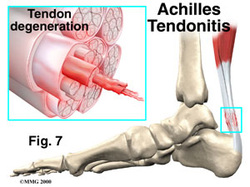
Overview
Achilles tendinitis is present when your Achilles tendon becomes inflamed or irritated.
Often, Achilles tendinitis results from sports that place a lot of stress on your calf muscles and Achilles tendon, such as basketball. Achilles tendinitis also is often associated with a sudden increase in the intensity or frequency of exercise.
When treated promptly, Achilles tendinitis is often short-lived. Left untreated, Achilles tendinitis could cause persistent pain or cause your tendon to tear (rupture). If so, you may need surgery to correct the damage.
Achilles tendinitis is present when your Achilles tendon becomes inflamed or irritated.
Often, Achilles tendinitis results from sports that place a lot of stress on your calf muscles and Achilles tendon, such as basketball. Achilles tendinitis also is often associated with a sudden increase in the intensity or frequency of exercise.
When treated promptly, Achilles tendinitis is often short-lived. Left untreated, Achilles tendinitis could cause persistent pain or cause your tendon to tear (rupture). If so, you may need surgery to correct the damage.
Symptoms
The signs and symptoms of Achilles tendinitis often develop gradually. They include:
If you have sudden pain and swelling near your heel and are unable to bend your foot downward or walk normally, you may have ruptured your Achilles tendon. If you've ruptured the tendon completely, you won't be able to rise on your toes on the injured leg. You may feel as if you've been kicked in the back of your ankle. See your doctor immediately if you suspect you have an Achilles tendon rupture.
Treatment
The most effective treatment of achilles tendinitis is custom orthotics with rear foot posting to elevate your heel within the shoe. Heel lifts may be necessary if standard posting with 1-2mm post cap does not provide relief.
The signs and symptoms of Achilles tendinitis often develop gradually. They include:
- Dull ache or pain when pushing off your foot during walking or when rising on your toes
- Tenderness over your Achilles tendon
- Stiffness that lessens as your tendon warms up
- Mild swelling or a "bump" on your tendon
- A crackling or creaking sound when you touch or move your Achilles tendon
If you have sudden pain and swelling near your heel and are unable to bend your foot downward or walk normally, you may have ruptured your Achilles tendon. If you've ruptured the tendon completely, you won't be able to rise on your toes on the injured leg. You may feel as if you've been kicked in the back of your ankle. See your doctor immediately if you suspect you have an Achilles tendon rupture.
Treatment
The most effective treatment of achilles tendinitis is custom orthotics with rear foot posting to elevate your heel within the shoe. Heel lifts may be necessary if standard posting with 1-2mm post cap does not provide relief.

 RSS Feed
RSS Feed
